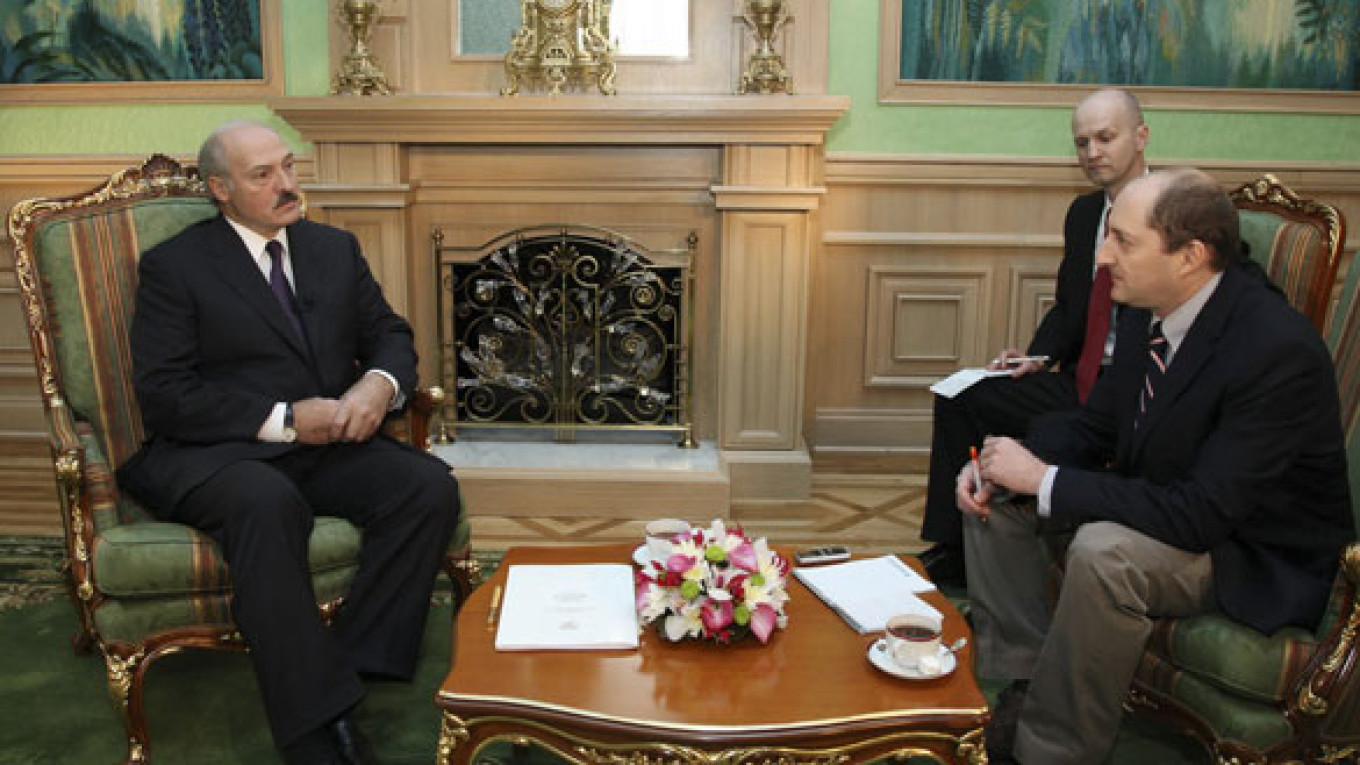MINSK — Belarussian President Alexander Lukashenko has lashed out at the West, saying he has received little in return for his efforts to improve relations with the European Union and the United States.
"I cannot even talk about all the steps that I have taken that are very sensitive for us — and the West cast me aside," said Lukashenko, who is under Western pressure for political reform and broader civil rights in Belarus.
"I have come to understand that there is a huge number of irresponsible politicians in the West," he said.
In a wide-ranging interview on Tuesday, Lukashenko accused Russia of tightening the screws on Belarus by scrapping preferential oil pricing, but stopped short of threatening to torpedo a nascent customs union over the dispute.
He criticized both Moscow and the West for engaging with the leaders who took power in Kyrgyzstan after a violent upheaval last month and vowed not to hand over ousted President Kurmanbek Bakiyev, who has taken refuge in Belarus.
"Russia and the West create a terrible precedent when they support an illegal government that came to power through bloodshed," he said.
He warned that any appeal for Bakiyev's extradition would be "hopeless."
Moscow's embrace of Kyrgyzstan's interim government has sent a potentially alarming signal to Lukashenko, who has relied on Russian economic and political support during his 16-year rule. Long shunned by the EU and the United States, which accuse him of maintaining power through unfair elections and the harsh suppression of dissent, Lukashenko has sought to improve ties with the West as Moscow has decreased its backing.
But he expressed deep dissatisfaction with the West during the interview and made clear that Western leaders should not demand more political reforms unless they are prepared to reciprocate by lifting sanctions and showing more respect.
"There have been some good moves, but this is a process of unrealized hopes, both in the West and on our side. We expected more fr om the West," he said. "What we will not tolerate is for somebody to order us around — nobody can shove us fr om behind.
"We will take exactly as many steps as the West is ready to take," Lukashenko said.
After his government released inmates seen in the West as political prisoners and made some concessions on European demands for electoral reforms, the EU suspended travel sanctions that it had imposed after Lukashenko's re-election in a 2006 vote that was not recognized by the West.
But it has not lifted the sanctions altogether or returned preferential trade conditions also denied as punishment.
Lukashenko said Western governments would not be satisfied until he is no longer president. But he strongly suggested that he would seek another term in a presidential vote early next year.
He said he had not decided whether to run, but added that the Belarussian people expect him to do so and that "there are no factors now that would force me to refuse to participate."
"The West doesn't like our course and doesn't like the current president — that's all there is to it. Let's be honest," Lukashenko said. "But the president is elected by the people, not by the West. The sooner the West understands that, the faster we will build normal relations."
Amid disputes with the Kremlin over oil supplies and Kyrgyzstan, Lukashenko said "maybe in Russia somebody would like to see a different president here."
Lukashenko, who pushed though legislation in 2004 that removed presidential term lim its, warned both the East and the West not to hope for a repeat of the Kyrgyz scenario in Belarus.
"No matter how the situation develops here, nobody will have the slightest possibility of ousting those in power here," he said.
Lukashenko, who said he had spent the whole day on Sunday with Bakiyev in Belarus, suggested that he was contributing to stability in Kyrgyzstan by giving Bakiyev refuge. The interim government has "1,000 problems," he said.
"The interim government of Kyrgyzstan should bow to the ground and thank me for removing the 1,001st problem," he said, referring to Bakiyev's departure from the Kyrgyz political scene. "The situation there is under very little control as it is."
Lukashenko indicated that Russia's insistence on charging Belarus duties on oil could jeopardize the customs union it is developing with Belarus and Kazakhstan — the most concrete step by former Soviet republics to create a strong economic alliance. But he spoke cautiously and stopped short of a threat to withdraw.
"This union will hardly have prospects if we veer away from our agreements or violate fundamental principles. But I think that everything lies ahead of us. We have just started creating this union," he said.
"To leave it without even entering it would hardly be right. Let's see how the atmosphere develops. I am certain that if everything is fine, others will join us, too."
A Message from The Moscow Times:
Dear readers,
We are facing unprecedented challenges. Russia's Prosecutor General's Office has designated The Moscow Times as an "undesirable" organization, criminalizing our work and putting our staff at risk of prosecution. This follows our earlier unjust labeling as a "foreign agent."
These actions are direct attempts to silence independent journalism in Russia. The authorities claim our work "discredits the decisions of the Russian leadership." We see things differently: we strive to provide accurate, unbiased reporting on Russia.
We, the journalists of The Moscow Times, refuse to be silenced. But to continue our work, we need your help.
Your support, no matter how small, makes a world of difference. If you can, please support us monthly starting from just $2. It's quick to set up, and every contribution makes a significant impact.
By supporting The Moscow Times, you're defending open, independent journalism in the face of repression. Thank you for standing with us.
Remind me later.


